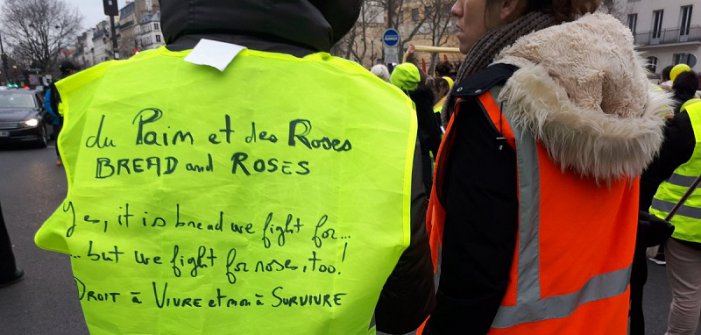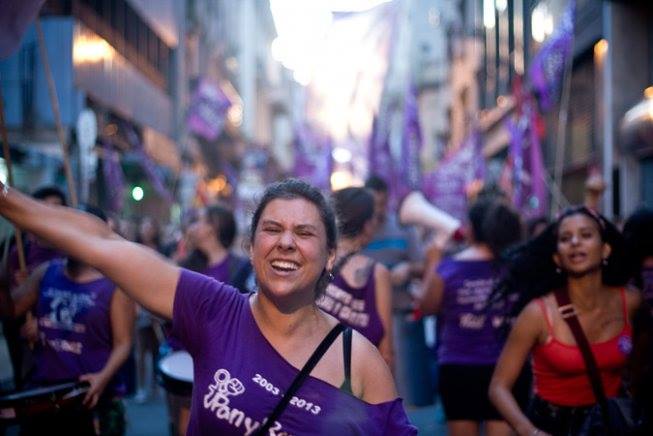Much has changed in the world since last year’s International Women’s Day which saw millions take to the streets. Taking place in cities around the world were strikes, symbolic work stoppages, protests, mass meetings and assemblies. The majority of participants work in precarious conditions, earn low wages, live below the poverty line, and in many places are second-class citizens, deprived of elementary rights such as bodily autonomy. This was the case in Argentina, which in 2018 mobilized like never before for the right to legal, safe and free abortion, only to see the reactionary upper house of Congress defeat the bill after it was narrowly passed by the lower house a week earlier.
Countering the forward march of the right, with its uneven but various expressions across the Americas and Europe, is necessarily high on the agenda of many upcoming demonstrations, as these conservative forces are placing women and LGBT people at the center of their attacks.
From Brazilian President Jair Bolsonaro, to the far-right Vox (Voice) formation in Andalusia, to the openly misogynistic discourse of Donald Trump; these forces claim to fight “gender ideology” while pushing to overturn rights previously won through decades of mobilization.
In addition to right-wing extremism there are the cuts and austerity measures of numerous governments that drastically scale back or eliminate reproductive health programs, the fight against sexual violence, and much more. These budget cuts have a direct impact on the lives of many women, for whom the traditionally feminine duties of care and nursing then become multiplied. It is in this context that the demonstrations planned for March 8, 2019 have developed.
Confront the Powerful, Defend Our Rights
In countries all over the world, the different strategies that run through the feminist and women’s movement are being debated as part of preparations for March 8. The need for political independence, the refusal to become the bargaining chips of governments, and the pressure to “tone down” women’s demands during parliamentary elections; all of these issues are under discussion. All the while, women are in the front lines of the ongoing battles with the reactionary right, various neoliberal projects and imperialist interference — currently on display in the U,S. offensive against Venezuela but also in Brazil, Argentina and Mexico.
The Gilet Jaunes (or Yellow Vests) of France are a symbol of resistance against governments, in this case that of Emmanuel Macron, whose austerity measures guarantee large profits for big business at the expense of the majority of the population. The protests each Saturday, which often feature violent police assaults, are an inspiration for those who refuse to bow down and instead take to the streets (they have even inspired similar demonstrations in neighboring Belgium). Despite the image portrayed in the media, women are major protagonists of the Gilets Jaunes movement, and their presence in the March 8 mobilization is currently being debated in Paris.

In Brazil, Bolsonaro’s frontal attacks on women and LGBT people, continuing state violence, and the directed assassination of Marielle Franco (a crime still unprosecuted) are focus of March 8, along with the rejection of labor and social security reforms. The results of Bolsonaro’s regime are disastrous enough for the general population, but they are catastrophic for women who are overrepresented in the most precarious sectors of work and paid the lowest wages (and tend to be black and younger as a whole). Pão e Rosas (Bread and Roses) is taking part in meetings, assemblies and demonstrations in São Paulo, Rio de Janeiro and other major cities across Brazil this March 8.
In Chile, the women’s movement will again take to the streets in protest of one of the ‘models’ of the region’s right. This year’s mobilization takes aim at the neoliberalism and repressive measures of President Piñera, which have targeted young people, the protagonists of the social movements that have rocked the Chilean political scene in recent years.
In Spain, the demands and actions for March 8 are decided on at a series of state-wide meetings. Prominent within the call for a strike on M8 is the rejection of xenophobic policies. Previously, in 2018, numerous unions added their names to the call for a strike which saw over 5 million people take part. This year, trade unions and the Left have reiterated their call for a 24-hour strike while the two largest trade union federations are only calling for a token two-hour strike. Pan y Rosas (Bread and Roses) has consistently defended the need to strengthen the joint struggle of the women’s movement, along with pensioners, migrants and the working class.
In Mexico, the beginning of 2019 was marked by those rebelling against exploitation in the strike of male and female factory workers of Matamoros for decent wages and better working conditions. With the blueprint that these workers have laid out, Pan y Rosas (Bread and Roses) has insisted that, in order to make these strikes truly effective, the independent Unión Nacional de Trabajadores (UNT – National Workers’ Union) and Nueva Central de Trabajadores (NCT – New Workers’ Federation) must form a coordinating committee that involves all those on strike. Calling for an end to dangerous work is a major demand for March 8, along with demands for an end to the trafficking networks and femicides, a scourge felt daily by Mexican women and girls. The main mobilizations are expected to take place in Ciudad Juárez, Chihuahua, Guadalajara, Jalisco and in Mexico City.
In the United States, there has been a resurgence of strikes in sectors of the workforce made up of predominantly women. Teachers in last year’s “Red State Rebellion” and more recently, in Oakland and LA went on strike. In New York City, nurses in four hospitals vote to authorize a strike by 97%. For International Women’s Day, there will be a rally in Union Square at 5 pm.
A Movement That Can Be Ignored No Longer
The protests ignited by the fight against sexual violence and harassment, and for equal rights (whether in countries where these rights are still denied or in others where they are under attack), have flooded the streets of many cities around the world. In many ways, the women’s movement has acted as a loudspeaker for the social discontent and economic crisis that exist in society. A similar thing occurs when the parties of the far-right wave the banner of misogyny, homophobia and transphobia. Machismo (chauvinism), homophobia and violence against women all amplify the worst side of democracy. Cuts in social programs that target reproductive health, legal abortion, and the struggle against violence, all of which were won through mobilization and struggle, lay bare the willingness of governments, from the right to the so-called progressive and “lesser evil” variety, to sacrifice the rights of many in order to maintain the privileges of a minority class that lives off the labor of the majority, benefitting without so much as a thought for the oppression of millions.
The startling and enormous Women’s March in the United States that “welcomed” President Trump in 2016 was the spark that has reignited the women’s movement, which had kept off the streets for decades, and has seen it adapt and combine with a new generation. This is the case in France, where there are many debates over how women’s demands play out within the Yellow Vest movement . Like the photograph of one female Gilet Jaune protester which has circulated across the globe, this debate has been expressed by some as the fight “du Pain et des roses” (for bread and for roses).
In Germany, a “women’s strike” is being prepared for the first time since 1994. Now as in then, the priorities are for the defense of the right to abortion, which is again under attack by the German right, and against the wage inequality which remains in force. The struggles of health workers against precarity are a sign of the times where the “women’s agenda” is that of the majority of the working class. Just as in Spain and France, the rejection of racist policies will also be a part of the platform. But what role will be played by the unions? For now, they refuse to call any action, but in the workplaces several forms of protest are starting to be discussed.
In the national meetings that are preparing the women’s strike, Brot und Rosen (Bread and Roses) have insisted on taking their demands into the unions, so that workers of both sexes can participate in the strike. The strike is also being promoted in secondary schools in cities such as Munich, where young people have mobilized against the consequences of climate change, in an effort to unite the struggles in which young women have played leading roles.
The Demands of This M8
Internationally, the right to an abortion continues to be one of the primary issues of the Women’s Strike. In Argentina the demand to legalize abortion will once again hit the streets on M8. This will be despite maneuvers by some to tone down this demand during an election year which, with the exception of the Frente de Izquierda (Left Front), have put in question the parties that are divided on this demand because of their links to the Catholic Church.
In countries such as Bolivia, Uruguay and Costa Rica, March 8 will be an opportunity to demonstrate the strength of the women’s movement. In Bolivia, two main actions are being prepared, one for the capital city of La Paz and the second for the neighboring city of El Alto. The demands that will lead the marches focused on the rights of working and indigenous women, and the fight against machista (chauvinist) and patriarchal violence. In Uruguay, both the Feminist Coordinating Committee of Uruguay and the Assemblies of Lesbian and Trans Women held a few weeks ago are preparing for a large demonstration. They are also discussing how to make the strike effective, since in previous years the PIT-CNT union federation has called for 24-hour strikes but has only ever organized partial stoppages in some areas. In Costa Rica, an overlapping mobilization is being prepared to take on both attacks by legislators of the evangelical right and the attempts of the “progressive” ruling party to stop the demand for legal, safe and free abortion from continuing to grow. The Forum for Abortion, an area of debate and organization at the University of Costa Rica, and in which Pan y Rosas participates, has proposed the formation of an independent bloc for taking this demand back to the streets of San José this M8.
In these countries, Pan y Rosas calls on the union federations and indigenous organizations to issue united calls for strikes and demonstrations on M8. It also insists on maintaining the political independence of the movement as the only guarantee that our rights do not continue to be ignored by capitalist parties, which time and again have demonstrated that they are in no way interested in the lives of the majority of women.
Article first published at La Izquierda Diario on February 26, 2019.











